CALL TO CONTEMPLATIVE LIFE
Fra' Francesco | Posted on |
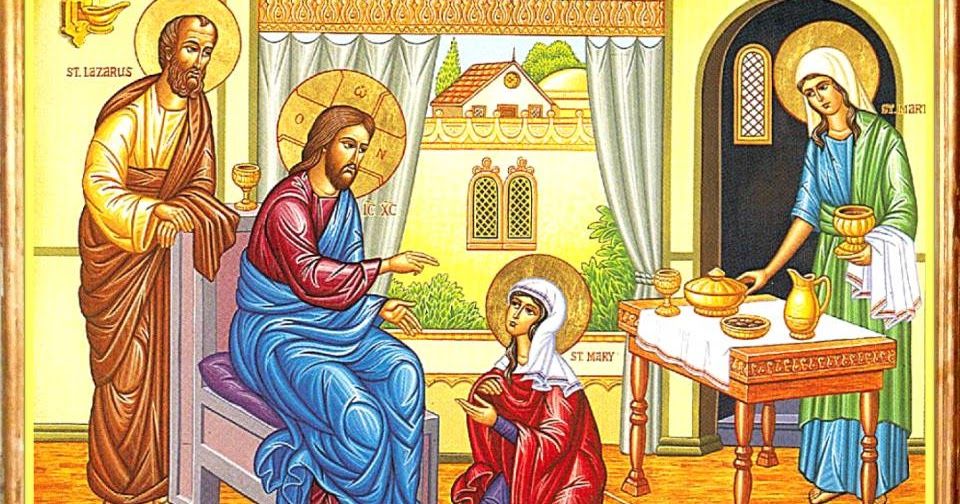
by the Reverend Father Prior
Dear faithful,
I thank with all my heart the priests who invited me to come and speak to you this morning about the contemplative life which is not the exclusive property of the monk, but to which is called every christian who desires to delve further into the knowledge and the love of God, following the example of Our Lord Jesus Christ.
But first, I would like to introduce you to our Community of the Benedictines of the Immaculate. Our Community was founded in Italy and approved by Mgr Mario Oliveri in the diocese of Albenga-Imperia on the feast of the Visitation, July 2, 2008.
The beginnings were humble and poor in the old presbytery of Villatalla, a small mountain village with a panoramic view of great beauty and whose horizon traced by the blue line of the Mediterranean seems to escape towards infinity. The Michelin Guide calls this region: “Enchanting Liguria”. Eleven years later, our community was transplanted very close to the French border, in Taggia, in a 17th century Capuchin monastery with its church, its cloister, its vaulted refectory and its 14 cells. As you can imagine, this four-century-old monastery requires many restorations.
In the wake of our move to Taggia, in this same year, a feminine branch of Benedictine nuns of the Immaculate was “born”, and settled in Villatalla, on the very property where we ourselves had begun our foundation.
Our contemplative life is lived according to the Rule of Saint Benedict and consecrated to the Virgin Mary, in the mystery of her Immaculate Heart, “because this Heart represents the ideal of the two characters of the ‘monastic Work’ which Our Lord asked of our founders: interior life and immolation.”
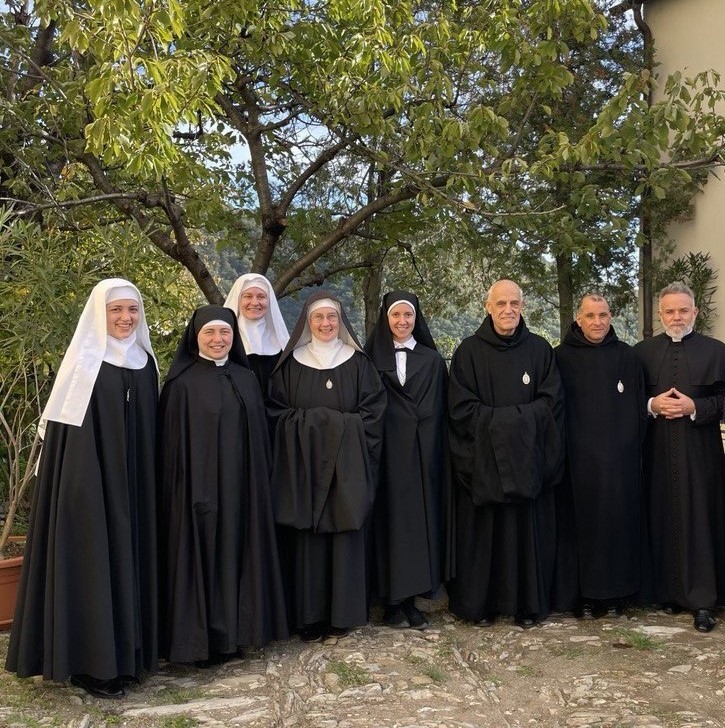
In the crisis that the Holy Church has been going through for several decades, we desire, as is stipulated in our Constitutions, “to maintain without fail the double rampart: the Holy Rule and the Holy Liturgy, as the best guarantors of the purest Catholic faith and of the greatest sanctity”.
We will distribute to you at the end of the Mass a leaflet, which will inform you about our two communities and the means to help us financially, if you can. Thank you from the bottom of my heart.
♦ ♦ ♦
At the beginning of Lent, the Church invites us to penance and prayer. This morning, I will not be speaking to you about penance, even though it is so necessary for our sanctification and our salvation; Our Lord declared to the Pharisees: “If you do not do penance, you will all likewise perish”.
I would like to speak to you about contemplative life. What is contemplation?
Saint Irenaeus said that “The glory of God is the living man, and the life of man is the contemplation of God”. To contemplate God is therefore to truly live, to live from the very life of God. To contemplate God is to give Him glory, to contemplate God is therefore eternity begun here below, where the soul is in touch with the eternal present of God.”
Indeed, God created everything for Himself, for His glory, and creation can only find its end in Him.
We already see in the Old Testament that Moses was a great contemplative. The book of Exodus relates that he went up to the mountain and the glory of Yahweh remained on Mount Sinai, which a cloud covered for six days. On the seventh day God called Moses out of the cloud, and the glory of Yahweh was like a consuming fire. Then Moses entered into the cloud. He remained there for 40 days and 40 nights: 40 days and 40 nights of contemplating the glory of Yahweh! His glory was a devouring fire of light and love.
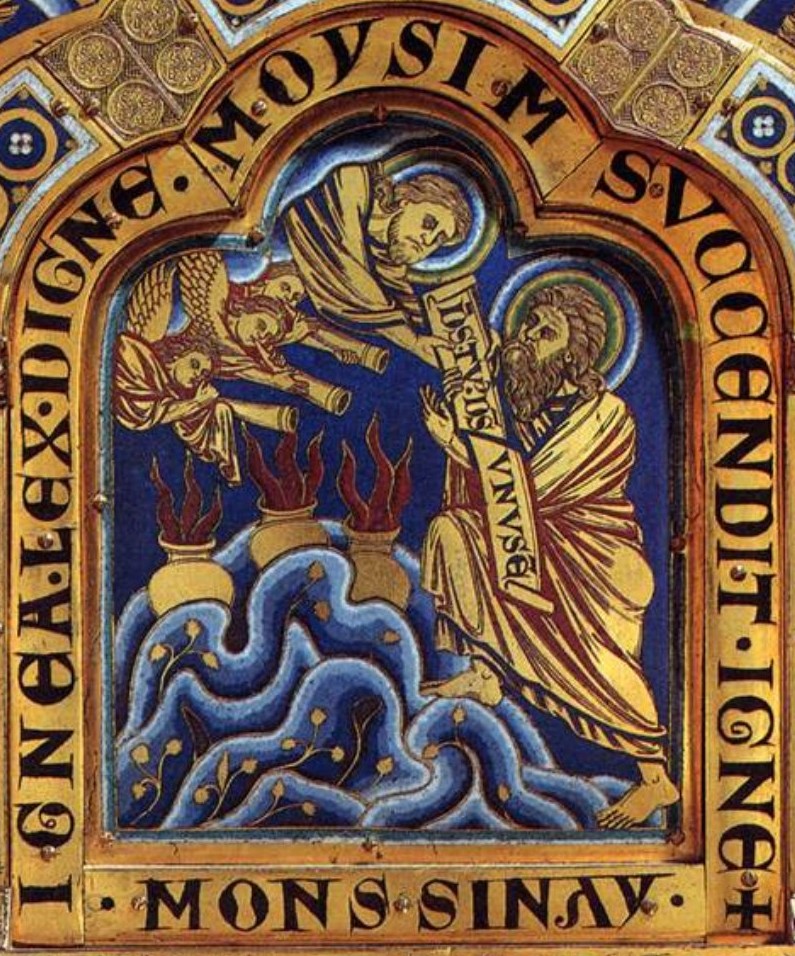
However, God only allowed Himself to be contemplated in the midst of the cloud, a symbol of Faith. We can therefore already deduce that contemplation is a gaze of Faith fixed on God, who is present but invisible.
Again, in the Gospel we have the story of the Transfiguration it shows how the act of contemplation is the very life of God Himself. God contemplates Himself by contemplating His only begotten Son: “Hic est Filius meus dilectus in quo mihi COMPLACUI”, “This is my beloved Son in whom I am well pleased”. And reciprocally, God the Son contemplates Himself by His contemplation of the Father: “ Amen, Amen , I say unto you, the Son cannot do anything of Himself, but what He seeth the Father doing: for what things soever He doth, these the Son also doth in like manner. For the Father loveth the Son and sheweth Him all things which Himself doth…”. There is nothing that the Son can achieve without keeping His gaze fixed on the Father. See how the Son delights in the Father and how the Father delights in the Son!
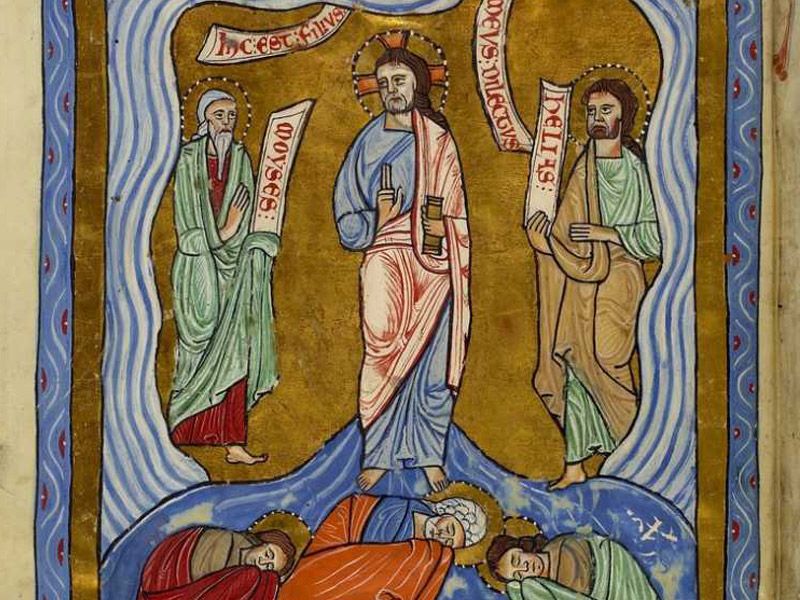
This gaze of delight on the beloved also constitutes contemplation. In God the Father, as in His Divine Son, this look of complacency has no end: “My Father worketh until now, and I work.” No human contemplation will be able to reach this sublime degree of divine contemplation. Nevertheless, Our Lord Jesus Christ still calls us to follow Him and to share in this filial contemplation; both here below, in the obscure light of the Faith and afterwards, in Heaven in an eternal face to face.
A farmer in Ars, France, who each day, before and after work spent a long time before the Blessed Sacrament, was asked by his saintly parish priest: “My friend, what could you possibly be saying to the Good Lord?” “Nothing,” replied the farmer, “I look at him and he looks at me”. Contemplation also lies in the simplicity of the gaze. The soul gathers and unifies its faculties to raise them up and turn them towards God: this pure attention is contemplation. It is the highest action that man can perform on earth. The soul is no longer in itself, but immersed in God. Contemplation, says a Carthusian, is “the act of a soul that forgets itself, motionless, before something more beautiful than itself”. But if external silence is often required, internal silence and a certain solitude will always be indispensable. “I will lead you into the desert to speak to your heart”, says God to the prophet Hosea.
That’s why the Curé d’Ars, one of the most tireless apostles of all, and also one of the greatest contemplatives of our time, said of contemplation that it is “a foretaste of Heaven, an outflow of Paradise”.
We can therefore summarize by saying that contemplation is a simple look of complacency by which the soul, forgetful of itself, allows itself to be delighted by the sight of the Beauty and the ineffable Holiness of God.
My dear brothers, if it is impossible for us poor people to live continually in contemplation, because, as a Chinese proverb says, man cannot always live on his tiptoes, he should at least as often as possible turn his regard towards God. The worries of this world should not distract us from giving our attention to this paternal presence of God which continually surrounds us and draws us to itself. Dom Placide de Roton, a Benedictine abbot, said “that there are several regions in the soul. We can remain with God even amongst other occupations, in carrying out our daily tasks, in conversation. Let us let the outer region of our soul deal with our neighbor and at the same time, let us remain in the inner region, where God is so that it is God who speaks, God who handles the matter, God who does everything.”
Let us now see the fruits that contemplation brings
For ourselves:
- The first of these fruits is God Himself: God who gives Himself as Truth, God who gives Himself as Love, God who gives Himself as Plenitude.
- The second fruit is aversion to sin, to all sin. Once we have tasted the grace of God, we feel not only the emptiness of the goods of this earth, but also a certain disgust for sin, although so desired by the flesh.
- The third fruit is the lessening of the weight of concupiscence. And this is to be remarked; for the soul is where it loves, in the object of its love which is God contemplated, rather than in its body where it is solicited by concupiscence. Because the soul is entirely lost in God, temptations no longer have a hold on it; they will no longer intrude there where the soul no longer is present. Contemplation is therefore a very effective remedy for concupiscence. The more we live in the presence of God, the more we taste true freedom.
- Lastly, the fourth fruit which results from contemplation is the efficacy of action, natural and supernatural. Contemplation not only removes the obstacles that corrupt our actions; pride, the desire for power, vanity, etc. but above all it orders all human action to its supreme end, God, who is the measure of all things and thus communicates to it great efficiency and more capacity in action. Saints often achieve great things. Didn’t Saint Teresa of Avila say that “contemplation is the lever of action”?
For our neighbor:
- The servant of God, Elisabeth Lesueur, said that “whoever elevates himself, elevates the world”. When a holy archbishop, apostolic delegate for French-speaking Africa, founded a mission, he first and foremost established there a community of contemplatives, who, by their presence, were comparable to leaven to raise up a new Christendom.
- In the same sense, Don Gérard said that “monasteries are a finger silently pointing up to Heaven, the obstinate, intractable reminder that there exists another world other than the present world of which it is only the image, which ‘announces and prefigures it’.
And now I speak more directly to you young men and women:
Yes, young men and young women who are listening to me, I would like God to speak to your hearts through my voice. I ask you the question:with Eternity in view, what would you like to do with your future? Do you know how to hear the voice of God speaking deep in your soul? And what answer will you give Him?
The rich young man of the Gospel, the Apostles and so many saints throughout the life of the Church, hundreds of thousands of monks and nuns heard this invitation to follow Our Lord more closely. Unfortunately, the rich young man turned away because he was attached to his possessions more than to God and his soul was then overcome by sadness, while the Apostles, says the Gospel, immediately left everything: Jesus said to them, “Come after me.” Immediately, leaving their nets, their boat and their father there, they followed him. Some are called to the apostolate, but others, like Saint Mary Magdalene, have chosen the best part; as Dom Gerard said: “God infinitely deserves creatures that deliver themselves up, devote themselves entirely, forever and exclusively, to gazing at Him, to praising Him, to adoring Him. This, he added, is what should be normal…”. Now listen to these words of Saint Benedict in the prologue to his Rule: “The Lord, seeking his worker in the crowd, to whom he appeals, continues: who is the man who wants life and desires to see happy days? If, having heard, you answer: “I do”, God says to you: Do you want to have true Life, eternal Life? …Then my eyes will be fixed on you, I will listen to your prayers and, even before you call on me, I will say to you: “Here I am”. What could be sweeter, beloved brother, than this voice of the Lord which invites you? See with what tenderness the Lord shows you the road to Life! “.
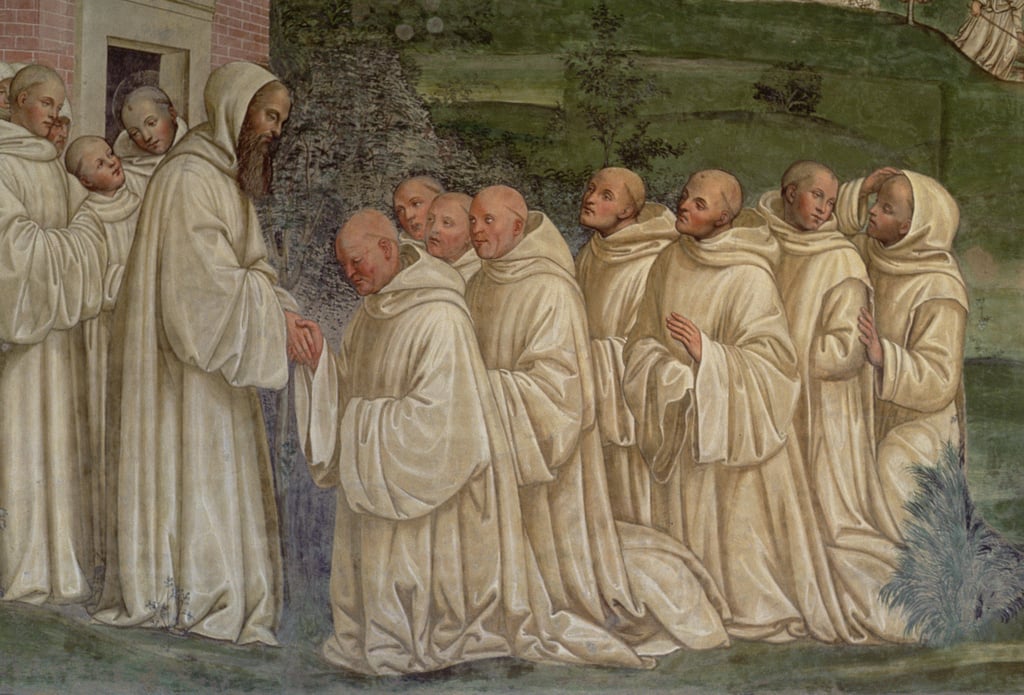
Lastly, let me quote to you a thought from André Charlier, the founder of the Roches school, in Périgord, of which the Reverend Father Gérard Calvet was the student and disciple. He said to those he called “captains”, that is to say those responsible for a group of students, these words still very actual: “It is a formidable spiritual battle which is being waged and this is why you must be armed. The cannons, the tanks, the atomic bomb, have only a relatively slight importance. What is important is what happens in the soul. You are challenged in many ways within yourselves. Have the will to always respond to the highest call.” My dear brothers, may the Grace of this Holy Lent, into which we have entered, forge in us contemplative souls which will make us not only “adorers of God” but also “saving souls”. And may the Immaculate Virgin, model of contemplative life and mother of Holy Hope, lead us to live, in the midst of the vicissitudes of this world, with our eyes fixed on where the true joys of Heaven are.
Amen !
